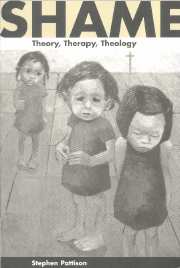Book contents
- Frontmatter
- Contents
- Preface
- Introduction
- PART I APPROACHING SHAME
- PART II ENCOUNTERING SHAME
- Overview of Part II
- 3 The ecology of shame
- 4 Chronic shame
- 5 Some effects and implications of chronic shame
- 6 Aspects of the socio-historical significance of shame
- 7 Dealing with shame: the task of integration
- Summary: towards a working understanding of shame
- PART III SHAME AND CHRISTIANITY
- Epilogue
- Bibliography
- Index
Summary: towards a working understanding of shame
Published online by Cambridge University Press: 05 June 2012
- Frontmatter
- Contents
- Preface
- Introduction
- PART I APPROACHING SHAME
- PART II ENCOUNTERING SHAME
- Overview of Part II
- 3 The ecology of shame
- 4 Chronic shame
- 5 Some effects and implications of chronic shame
- 6 Aspects of the socio-historical significance of shame
- 7 Dealing with shame: the task of integration
- Summary: towards a working understanding of shame
- PART III SHAME AND CHRISTIANITY
- Epilogue
- Bibliography
- Index
Summary
The quest to understand shame has been a journey into increasing complexity. It has become clear that there is no one way of approaching or understanding shame, no one ‘reality’ that underlies all experiences of shame, no simple ‘lowest common denominator’ that links all uses of the term ‘shame’ together. Furthermore, there is no ‘master narrative’ that satisfactorily accounts for all, or most, aspects of the phenomenon of shame. All that is available is a range of different discourses in which shame is variously situated and understood. Sometimes these discourses are complementary, at other times they may be contradictory. Nonetheless, some important points have emerged.
In the first place, a number of significant distinctions can be made about usages of the term ‘shame’ which allow the identification of ‘types’ of shame. However, it is important to emphasise that the differences identified may be primarily those of discourse and usage. No claim is being made here for difference anchored in ‘objective reality’.
One type or usage of shame that can be distinguished is ontological shame. This may be characterised as shame that relates to being human and finding oneself to be limited and mortal. The state of being human, finite, mortal, embodied, dependent on others and so on involves fundamental shame (Hans 1991). This state of ontological shame is not unlike the ontological guilt described by Tillich (1962b). It can be destructive in its effects, However, there is little that can be done to alleviate this existential shame beyond recognising and accepting it. It is an inevitable part of human being and destiny.
- Type
- Chapter
- Information
- ShameTheory, Therapy, Theology, pp. 181 - 184Publisher: Cambridge University PressPrint publication year: 2000



